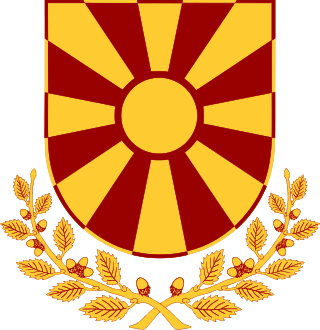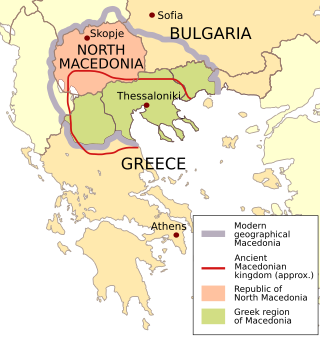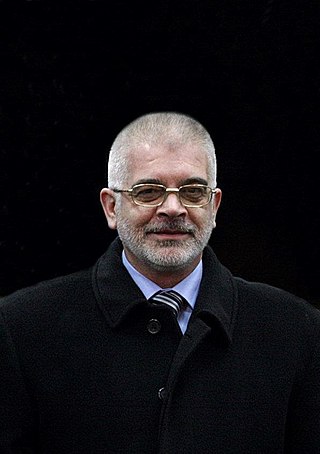The history of North Macedonia encompasses the history of the territory of the modern state of North Macedonia.

Politics in North Macedonia occur within the framework of a parliamentary representative democratic republic, whereby the Prime Minister is the head of government, and of a multi-party system. Executive power is exercised by the government. Legislative power is vested in both the government and parliament. The Judiciary is independent of the executive and the legislature. The Economist Intelligence Unit rated North Macedonia a "flawed democracy" in 2021.

The National Liberation Army, also known as the Macedonian UÇK was a militant, separatist militia that operated in the Republic of Macedonia in 2001 and was closely associated with the Kosovo Liberation Army (KLA).

Greater Albania is an irredentist and nationalist concept that seeks to unify the lands that many Albanians consider to form their national homeland. It is based on claims on the present-day or historical presence of Albanian populations in those areas. In addition to the existing Albania, the term incorporates claims to regions in the neighbouring states, the areas include Kosovo, the Preševo Valley of Serbia, territories in southern Montenegro, northwestern Greece, and a western part of North Macedonia.
The Albanians in North Macedonia are the second largest ethnic group in North Macedonia, forming 446,245 individuals or 24.3% of the resident population. Of the 2,097,319 total population in the 2021 census, 619,187 or 29.52% are Albanians.

The President of the Republic of North Macedonia is the head of state of North Macedonia.
A constitutional referendum was held in Serbia on 28 and 29 October 2006, in which voters decided on adopting a new Constitution. The constitution is Serbia's first as an independent state since the Kingdom of Serbia's 1903 constitution. Over 6.6 million people were entitled to vote in the national referendum.

The use of the country name "Macedonia" was disputed between Greece and the Republic of Macedonia between 1991 and 2019. The dispute was a source of instability in the Western Balkans for 25 years. It was resolved through negotiations between Athens and Skopje, mediated by the United Nations, resulting in the Prespa agreement, which was signed on 17 June 2018. Pertinent to its background is an early 20th-century multifaceted dispute and armed conflict that formed part of the background to the Balkan Wars. The specific naming dispute, although an existing issue in Yugoslav–Greek relations since World War II, was reignited after the breakup of Yugoslavia and the newly-gained independence of the former Socialist Republic of Macedonia in 1991. Since then, it was an ongoing issue in bilateral and international relations until it was settled with the Prespa agreement in June 2018, the subsequent ratification by the Macedonian and Greek parliaments in late 2018 and early 2019 respectively, and the official renaming of Macedonia to North Macedonia in February 2019.

Ilirida or the Republic of Ilirida is a proposed state in the western regions of North Macedonia, declared twice by the politician Nevzat Halili, once in 1992 and again in 2014. The proposal has been declared unconstitutional by the Macedonian government. The secessionist concept of Ilirida emerged in the early 1990s and was advocated by some Albanian politicians as a solution to concerns and disputes the Albanian community had regarding constitutional recognition and minority rights within Macedonia.
The World Macedonian Congress is a self-declared "non-formal parliament of the ethnic Macedonians". It presents itself as an organization fighting and demanding for more human rights to ethnic Macedonians on an international level, but is seen as an ultranationalist organization, supporting the controversial antiquization, by independent researchers and media. It is officially registered as a non-governmental organization based in North Macedonia. The organization was registered during the fall of communism, on 15 September 1990 by Todor Petrov, who is also the president of the organization. Closely related to the World Macedonian Congress are certain Macedonian organizations in the neighboring countries of North Macedonia from whom with larger importance, the Macedonian Party in Albania, the OMO Ilinden in Bulgaria, and the Democratic Party of the Macedonians in Kosovo founded by the organization’s member Ismail Boyda. The organization has been labelled as far-right by the Macedonian political scientist Zdravko Savevski.

North Macedonia, officially the Republic of North Macedonia, is a country in Southeast Europe. It gained independence in 1991 as one of the successor states of Yugoslavia. It is a landlocked country bordering Kosovo to the northwest, Serbia to the north, Bulgaria to the east, Greece to the south, and Albania to the west. It constitutes approximately the northern third of the larger geographical region of Macedonia. Skopje, the capital and largest city, is home to a quarter of the country's 1.83 million people. The majority of the residents are ethnic Macedonians, a South Slavic people. Albanians form a significant minority at around 25%, followed by Turks, Romani, Serbs, Bosniaks, Aromanians and a few other minorities.

Todor Petrov is a Macedonian nationalist. He is president of the World Macedonian Congress (WMC). Petrov is a councillor in the electorate of Gazi Baba.

The 2012 Republic of Macedonia inter-ethnic violence started in early 2012 and involved ethnic Macedonians and ethnic Albanians of the Republic of Macedonia.

A shootout which erupted during a raid between Macedonian police and an armed group identifying itself as the National Liberation Army (NLA) occurred on 9 May 2015 in the northern Macedonian town of Kumanovo. During the shootings, eight Macedonian policemen and 10 of the militants were killed, while 37 officers were wounded and hospitalized. The shooting ended on 10 May 2015, in an operation by the Macedonian police and armed forces, in which 28 men were arrested and charged with terrorism-related charges by the Macedonian authorities.
Poum is a village in the municipality of Struga, North Macedonia.
Albanian nationalism in North Macedonia traces its roots in the wider Albanian nationalist movement which emerged as a response to the Eastern Crisis (1878) and proposed partitioning of Ottoman Albanian inhabited lands in the Balkans among neighbouring countries. During the remainder of the late Ottoman period various disagreements culminated between Albanian nationalists and the Ottoman Empire over socio-cultural rights. The Balkan Wars (1912–13) ending with Ottoman defeat, Serbian and later Yugoslav sovereignty over the area generated an Albanian nationalism that has become distinct to North Macedonia stressing Albanian language, culture and identity within the context of state and sociopolitical rights. Pan-Albanian sentiments are also present and historically have been achieved only once when western Macedonia was united by Italian Axis forces to their protectorate of Albania during the Second World War.
The Karpalak ambush, referred to by Macedonians as the Karpalak massacre, was an attack carried out by the National Liberation Army (NLA) against a convoy of the Army of the Republic of Macedonia (ARM) near the village of Grupčin on 8 August 2001 amidst an ethnic Albanian insurgency in the country, in the final stages of the Yugoslav Wars. It was speculated that the ambush was carried out in retaliation for a Macedonian Police raid in Skopje the day before in which five NLA insurgents were killed. Ten members of the ARM's Military Reserve Force, including two officers, were killed at Karpalak and two others were wounded. The ambush was the single deadliest incident of the conflict up until that point.

A referendum was held in the Republic of Macedonia on 30 September 2018, with voters asked whether they supported EU and NATO membership by accepting the Prespa agreement between Macedonia and Greece, signed in June 2018, which aimed to settle the 27-year naming dispute, which had prevented Macedonia from joining both the European Union and NATO. Despite 94% of voters voting in favour, voter turnout was around 37%, less than the 50% threshold required to validate the results.

Presidential elections were held in North Macedonia in 2019. Three candidates were on the ballot in the first round, held on 21 April: Stevo Pendarovski, supported by the ruling coalition led by the Social Democratic Union of Macedonia, including the Democratic Union for Integration; Gordana Siljanovska-Davkova of the leading opposition party VMRO-DPMNE, and Blerim Reka, an independent supported by Albanian opposition parties Alliance for Albanians and Besa Movement. The first round did not result in an absolute majority for any candidate, with Pendarovski receiving the most votes. In the second round held on 5 May, Pendarovski defeated Siljanovska-Davkova with 54% of the vote.

The Open Balkan is an economic and political zone of three member states in the Balkans, those being Albania, North Macedonia and Serbia. The zone has a total area of 131,935 km2 (50,940 sq mi) and an estimated total population of almost 12 million located in Central and Southern Europe. The official languages are Albanian, Macedonian and Serbian. Its administrative centres are the cities of Belgrade, Skopje and Tirana. With the establishment of the zone, all three member states aim to increase trade and cooperation as well as improve bilateral relations.













